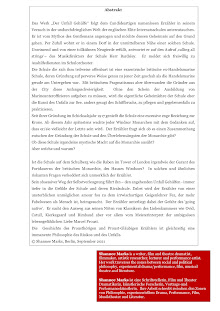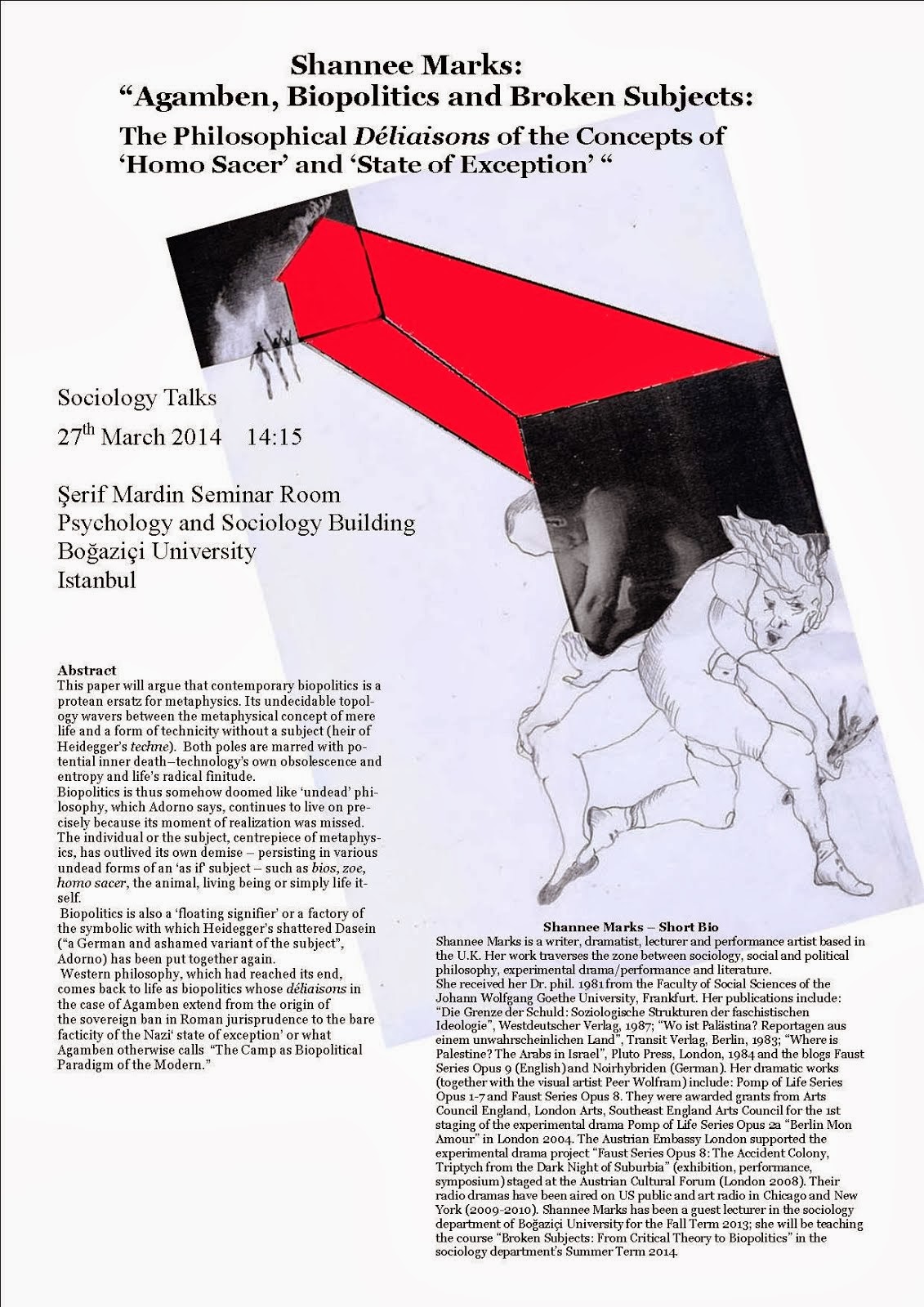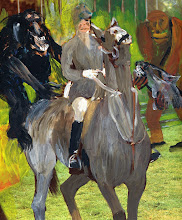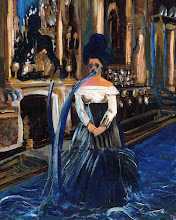1. A curse is a species of prophecy – at the very least it aspires to a telos. Both Plato and Aristotle, whose systems are grounded in teleology, believed nature was constantly moving towards perfection, its final cause. Causality is not located in the past but in the future of events, circumstances, phenomena, form. All the more with a curse. What is the telos of a curse? What is the striving for perfection of an accident, catastrophe, tragedy? One assumes that perfectability is only true of positive ‘goods’ – alchemical thinkers saw the transmutations of matter as an expression of the natural tendency of matter to reach ever more perfect states. Perfection though is not a moral value – it is rather the unfolding of a form already implicit in matter or in a ‘situation’. Otherwise how would one ever recognize any degree of perfection? In Simmel’s ‘sociological aesthetics’ based on his theory of types, beauty and ugliness depend on the closeness or distance from the type, the more typical, the more beautiful. He refers to the example of the physician for whom certain cancers are beautiful when their appearance is in no way clouded by attributes extraneous to their type. The type alone contains all the attributes of the individual - meaning it is an indefinite multiple almost in the sense Badiou uses ‘generic’. A curse would be beautiful in the same way as a face – not due to ‘some immanent content of a thing but, rather, its correspondence to its type.’ (Simmel)
Christian thought implies perfection as the completion of a catastrophe – in this sense the Crucifixion is doubly perfect. The cross is also a plus sign. Christ’s appearance on earth called forth the ‘happy sin’ of Adam, but the real ‘cause’ of his appearance was his later Crucifixion and Resurrection. Traditional hermeneutic interpretations of the apostolic and subapostolic literature imply a ‘futurist’ causality in which past biblical events ‘foreshadow’ or ‘prefigure’ the arrival of Christ. In other words – that which is to be determines from a not yet existent future location and moment that which was.
But a curse has a more complicated relation to the future than mere foreshadowing. One particular curse – that of the Tomb of Tutankhamun bears a striking resemblance to the structure of a psychoanalytic cure – not surprising given Freud’s love of archaeology and sensationalist tomb literature such as “She” by Henry Rider Haggard. The curse resembles the situation of the cure because in both the ‘analysand’ is offered a painful opportunity during a certain time and space to encounter a truth, he leaves this meeting ‘armed or disarmed’. (see Alain Badiou, “Truth: Forcing and the Unnameable” in: Conditions, London, 2008, p. 133) But this ‘truth’ is a suspended hypothesis – truth is never in the situation, it is its vanishing point, just as invisible as the origin of the curse or the event whose disappearance initiates the psychoanalytic cure.
The mummy’s curse is a prohibition – anyone who violates the tomb will be harmed. It seems to be a general formula – but one can assume that there is a very limited number of persons who would ever be likely to come so close to a Pharaoh’s tomb as to be endangered or threatened by the curse – especially if the location of the tomb and its existence are more or less unknown. The curse is then ‘waiting’ for those chosen few even if it takes them hundreds of generations to arrive.
To ‘arrive’ though the object of the curse has not only to come to a certain prescribed known destination – he has to first find or invent the destination. He undertakes a great work of discovery and exploration not unlike Freud’s category of “working through”, which Badiou following the mathematical concept of Paul Cohen, calls “forcing”. “Forcing concerns the point at which, although incomplete, a truth authorizes anticipations of knowledge, not statements about what is, but about what will have been if the truth reaches completion.”(Badiou, op. cit., p. 138) ‘What will have been’ for Lord Carnarvon, the alleged (hypothetical) prime victim of the ‘mummy’s curse’, was the completion of the search for the tomb - at the same time the necessary condition for the activation of the curse – the ‘forcing’ open of the door of the tomb.
2. If there is a ‘curse of the mummy’ then it embraced Lord Carnarvon before he ever set foot in Egypt. Carnarvon was already a magnet for ill fortune and accidents. The telos of such a curse seems passive – it cannot strive towards any final cause; if the prohibition is never violated no sacrifice will occur. Unless, the curse is a vigorous potentiality, which can create the necessary conditions to induce a violation, attract the transgressor.
It began with a car accident in Germany in 1901 - in the heroic days of automobile travel. Carnarvon was a car enthusiast, an ‘automobilist’, owning one of the first automobiles in England. He toured France in a car. The chauffeur was a close associate of the rich man in those days – his companion and ‘pilot’ in the pioneering world of automotive invention and other new technologies. The banker Albert Kahn travelled extensively in Japan with his chauffeur, who first had to become proficient in the new techniques of autochrome colour photography. Proust was most fond of his chauffeur Odilon, his wife Céleste became Proust’s live in maid and the intimate companion of his later years as a recluse. Odilon was still more of a coachman, owning his own vehicle – but permanently (and round-the-clock) at Proust’s disposal for all his outings. Proust was very close to the ‘revolution of the automobile’. One of his best school friends from the lycée Condorcet was Jacques Bizet, son of the composer Georges Bizet. Jacques Bizet was director of Taximètre Unic, a car-hire company created by Rothschild. Odilon was one of their drivers – and he became Proust’s favourite “chauffeur de confiance”. (Céleste Albaret, Monsieur Proust, Opera Mundi, Paris, 1973, p. 51)
Carnarvon was less fortunate in his choice of chauffeur. Whilst racing with his chauffeur in Germany they crashed – the car landed on top of Carnarvon, crushing his jaw and puncturing his chest and lung. His doctor then told him that his health was poor and he should seek a warmer climate. He began to winter in Egypt. That is how he was led into his grand Egyptian adventure, which would finally finish him off. All his love of the modern was diverted into Egyptology and the love of tombs.
Lord Carnarvon came like the ‘analysand’ in a state of weakness to the cure/curse – he travelled to Egypt ‘for his health’ and unknowingly entered a field of ‘emergent truth’. The truth according to Lacan – Badiou follows him in this assertion – is first of all weak. The love of truth is also the love of its powerlessness – for Lacan (and Badiou) this is none other than the “love of castration”. This love is obviously not openly declared – rather it is the love which the ‘truth veils’, only lovable in being unsaid or ‘half-said’ (Badiou).
The anticipatory direction of Lord Carnarvon’s time in Egypt is twofold – the anticipation of archaeological finds (tombs and treasures), the movement towards an unspecific ultimate end (the curse). He began his archaeological prospecting in a desultory fashion – to pass the time in Egypt. But he was soon possessed of a desire for better finds – he hired Howard Carter who fanned this desire till it became his obsession, his ‘objet petit a’. He had exchanged a daredevil chauffeur for a learned man. Their successes in finding tombs of minor nobles whetted their appetite for digging in the Valley of the Kings – with the hope of discovering royal tombs.
Then at the ‘last moment’, when Carnarvon’s interest in the hunt began to wane, due to mounting costs and no significant finds, Carter pleaded for one last season in the Valley of the Kings. He acceded to Carter’s wish, like the analysand who agrees to continue paying his analyst for the cure. The final train of events was set into motion. Carter was finally successful – he discovered the Tomb of Tutankhamun. Carnarvon ignored the dire warnings he had received from well known seers not to enter the tomb. He was quoted as saying “I will challenge the psychic powers of the age”. On November 26th 1922 the funerary chamber of the tomb was forced opened. Howard Carter and Lord Carnarvon were the first to enter the tomb. Shortly thereafter while resting in the Aswan area Carnarvon was bitten on the cheek by a mosquito. He accidentally shaved off the bite with his ‘cut-throat razor’ (‘love of castration’?) and poisoned his blood. After treating the wound, at first he seemed to recover, but on April 5th 1923 he died from the effects of blood poisoning and pneumonia. Strange coincidences were reliably reported to have occurred at the time of Carnarvon’s death. The lights went out in all of Cairo. His dog pining in Highclere, Carnarvon’s family seat, howled wildly and died. When the mummy of Tutankhamun was unwrapped it was found to have a wound on the left cheek corresponding to the point on Lord Carnarvon’s cheek where he was fatally bitten by the mosquito.
The truth of the curse emerged gradually over the course of the years Carnarvon spent financing excavations in Egypt. The truth moved from powerlessness to all powerfulness. The unsaid took place. The unnameable named. The curse is what Badiou calls the ‘unnameable point’ of a truth – “one that cannot be forced without inducing disaster”. (Badiou, op. cit., p.131)
Perhaps Tutankhamun’s dynastic enemies, followers of the god Amun, were the authors of the curse. They had relegated him to powerlessness, obliterating his name from statues and inscriptions. He had been effaced from history until that moment. That is why the discovery of his tomb had eluded all previous digs. Carnarvon and Carter helped restore Tutankhamun to ‘power’ and reinstate him in history.
“In the dimension of the future perfect, a truth’s power resides in the anticipation of its own existence (…)” (Badiou, op. cit., p. 139)
Would this power then be in Badiou’s phrase – ‘fidelity to the event’ of the future perfect?
































